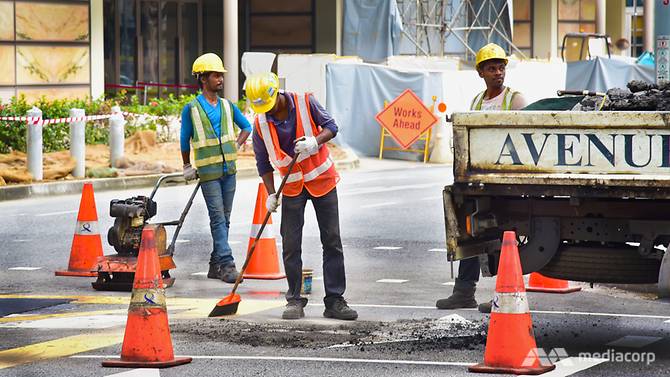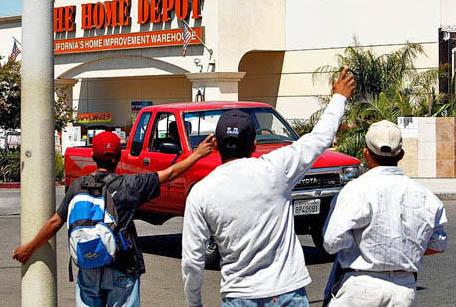
SINGAPORE: A reduction in the number of foreign workers in Singapore would have multiple implications on the economy and businesses, and also have a ripple effect on jobs for Singaporeans and housing prices, several industry groups said on Wednesday (May 27).
Singapore's foreign worker population and their housing conditions have been in the spotlight amid the COVID-19 outbreak, with some calling for change to migrant worker policies.
Foreign workers make up more than 90 per cent of Singapore's COVID-19 cases.
On Wednesday, several trade associations and ethnic chambers of commerce noted the important role foreign workers play in keeping Singapore's economy going, and the implications should there be a reduction in the number of migrant workers.
They pointed out several challenges faced by companies in filling labour-intensive roles, such as Singapore's ageing population and low birth rate, as well as a preference among Singaporeans for professional, managers, executives and technicians (PMET) jobs.
“Given Singapore’s limited manpower resources, we would not be able to stay competitive if there are insufficient migrant workers to complement the local workforce in our sectors,” said the Singapore Manufacturing Federation (SMF), the Association of Singapore Process Industries (ASPRI) and the Association of Singapore Marine Industries (ASMI) in a joint statement.
"Should Singapore lose its competitive edge in various industries, demand for labour will fall and jobs, livelihoods and businesses will be at stake. Consequently, there will also be fewer PMET jobs for Singaporeans, such as those in the export-oriented industries," they said.
Reducing the number of foreign workers in the construction sector would also make companies less able to compete for strategic projects such as building new manufacturing facilities, energy plants and tourist attractions, said The Singapore Contractors Association Ltd (SCAL).
Housing projects, including Housing and Development Board (HDB) flats, would become more expensive and take a longer time to build, it added.
Currently, the construction industry employs about 300,000 foreign workers and 100,000 locals.
"One important question is whether Singaporeans can accept higher costs and inconveniences if many of the rank-and-file jobs that keep our industry running are hard to fill by locals," said the Specialists Trade Alliance of Singapore (STAS) in a statement.
It gave the example of the maintenance of lifts and escalator, saying that fewer migrant workers would result in “further strains” and have “spillover effects” on costs and the safe operation of buildings other industries and workers rely on.
STAS comprises 11 association members, including the Air-Conditioning and Refrigeration Association of Singapore, the Singapore Plumbing Society and the Singapore Lift & Escalator Contractors and Manufacturers Association.
In their statement on Wednesday, the industry groups and ethninc chamber of commerces also noted that the "large majority" of employers in Singapore are responsible in looking after their migrant workers.
"As a baseline, the regulatory framework for migrant workers in areas such as housing, employment privileges and workplace safety and health is robust and has progressively improved over the years. We note that most employers comply with these regulations," said STAS.
SCAL said it was "aggrieved" that efforts to take care of migrant workers have been "misrepresented".
"Though we acknowledge that the housing condition here can be improved, by comparison, it is one of the best in the region. We are aggrieved that our efforts to take care of our FWs have been misrepresented by a handful of unfair comments that may not take into account the full scope of and challenges within our industry," it said.
It said that Singapore provides foreign workers with good working opportunities and stable living conditions, and that employers are encouraged to help foreign workers take on new skills and training.
"Singapore is a top choice in the region for FWs. Workers here earn significantly more than they would in their home countries. For some, their annual salary in Singapore is ten times more than what they would typically receive in their home country," it said.
The workers are also protected by the law in Singapore and have “multiple channels” to “seek recourse” should there be disputes or disagreements with employers, it said.
The SMF, ASPRI and ASMI added that employers in Singapore also offer benefits such as healthcare to its foreign workers, whose housing and amenities are “among the best”.
"We are proud that in Singapore, we have a housing system for migrant workers, which is not always a normal practice elsewhere. The housing and amenities we provide for migrant workers in Singapore are among the best," they said.
“A vast majority of our migrant workers voluntarily stay on in Singapore to work after they complete their initial contracts. Many stay for over 10 year and encourage their family members and friends to come to Singapore to work.
“These two facts are perhaps the strongest among others to refute reports or claims that living conditions in Singapore for migrant workers are dire,” they said.
In their joint statement on Wednesday, the Singapore Indian Chamber of Commerce and Industry, the Singapore Malay Chamber of Commerce and Industry and the Singapore Chinese Chamber of Commerce and Industry, said that migrant workers have enabled Singapore stay competitive.
"Migrant workers take on many of the lower-end jobs in Singapore. This allows the vast majority of Singaporeans to take on PMET jobs, and help in creating an innovation-based economy as well. Thus, we urge the Government and Singaporeans to carefully consider the next steps on migrant workers," they said.
https://www.channelnewsasia.com/new...ffect-singapore-economy-higher-costs-12774646

